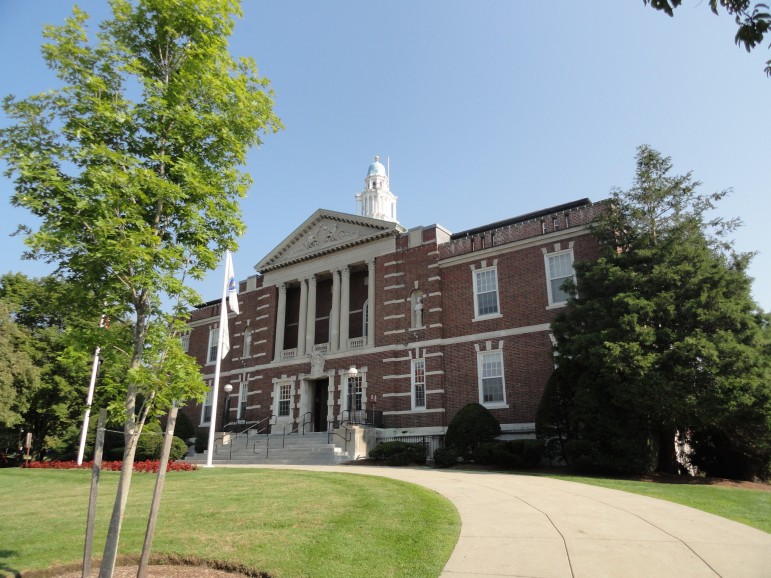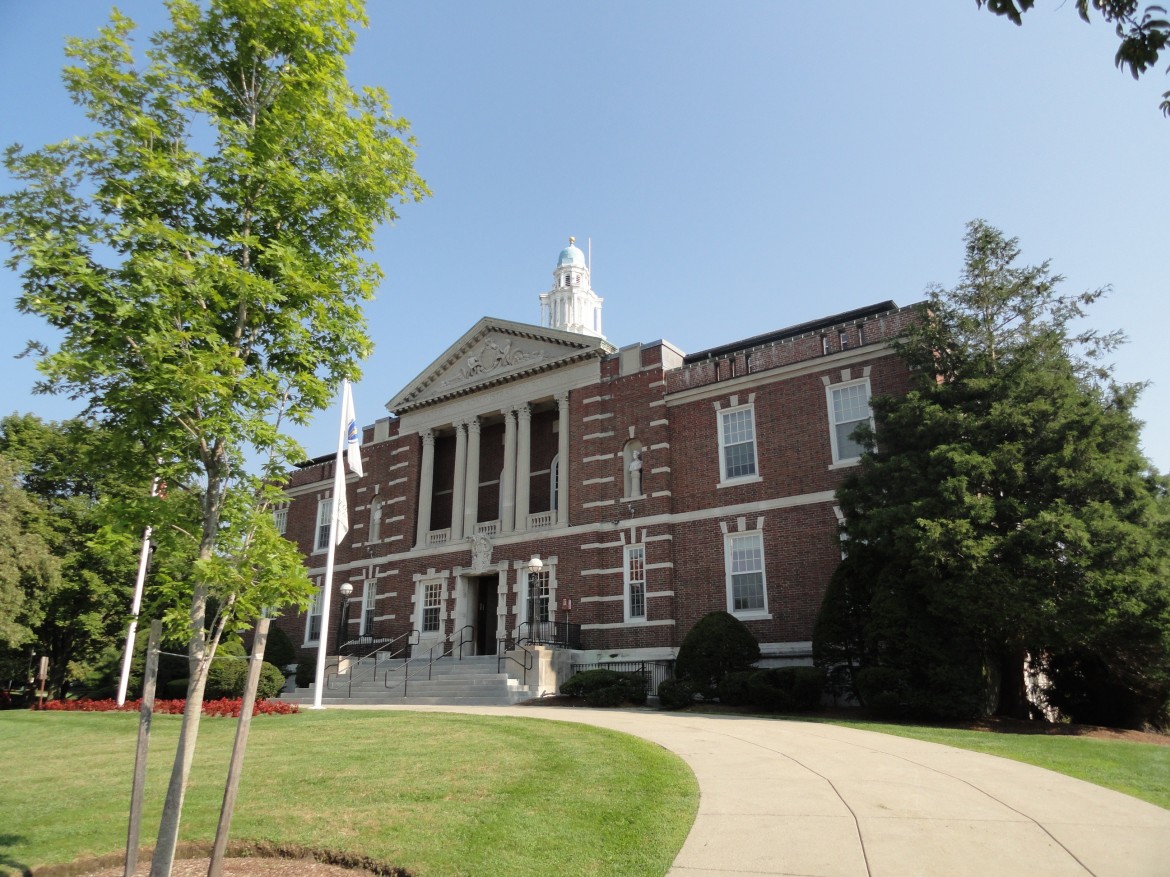
Watertown Town Hall
Watertown restaurants may be allowed to have bring-your-own alcohol, but first the details must be settled by a joint group of Town Council subcommittees.
At a joint meeting of the Rules & Ordinances, Public Safety, and Planning subcommittees on Thursday, steps were taken toward crafting the new ordinance which would allow BYOB.
The town has a limited number of liquor licenses – 34 – and it has requested 15 more from the state through a special home rule petition to the State Legislature. Some of these licenses have been earmarked for approved projects, and others have been limited to the business districts in town. Those restaurants falling outside those areas cannot apply for one of the new licenses.
A BYOB rule could not come soon enough for at least one Watertown restaurant. Royal opened on Main and Lexington streets in March, and has received good reviews for its food, but many diners have complained about the fact that they do not serve alcohol, said Melanie Nye, a partner in the restaurant with owner and chef Rachid Kourda.
“We are losing customers because we don’t have a liquor license,” Nye said. “We would prefer to have a full liquor license but we have been told we don’t fall in the new zone for new licenses.”
Nye brought reviews from Yelp and other sites which specifically said the restaurant should have BYOB, if it cannot get a liquor license. She told the Councilors that customers have walked out of the restaurant when they learned alcohol was not available.
Resident Rena Baskin, who is part of Belmont Watertown Local First, said she thinks BYOB would also help consumer choice, and noted that alcohol is expensive at restaurants with a glass of wine costing as much as a bottle at the store.
“If I want to have a glass of wine I don’t want to be told this is where I have to go,” Baskin said. “There are people who live here who cannot afford to dine at a fancy restaurant. They would be free to go to Royal and have a quiet dinner and bring their wine.”
One concern was the enforcement of the licenses. The BYOB would increase the work load at the same time the town could get 15 more liquor licenses, said Watertown Police Sgt. Thomas Grady.
The Police Department already runs inspections and follows up on reports of violations for restaurants with liquor licenses.
“It is one of my main responsibilities along with investigating crimes,” Grady said.
Grady runs inspections and investigates on reports of violations, such as underage serving and over serving. He said there are probably between 30 and 50 violations reported each year.
Rules for BYOB
Restaurants could not just start allowing BYOB. They would have to get a license, and would have to follow rules that will be enforced by the Watertown Police and the Licensing Board.
Councilors do not want to allow people to come in and serve themselves alcohol.
They agreed that alcohol would be given to the servers by customers, and then the servers would pour the drinks for the customers so they can control how much alcohol is consumed. In addition, servers would have to be trained on what forms ID are acceptable for proof of age.
They also want to make sure only sit-down restaurants can have BYOB.
“We want full service restaurants (to get BYOB licenses). We don’t want sandwich shops. We don’t want pizza shops (having the licenses),” said Councilor Vincent Piccirilli said.
The subcommittees agreed that they will have come up with the definition of a sit-down restaurant.
Council Vice President Steve Corbett said he does not want to limit the BYOB licenses to just “fine dining” restaurants. If a family restaurant with full waiter service wants one, he would like it to be available to them, too. The rest of the committee agreed.
How much the licenses will cost and how many should be available also came up for debate. Councilor Ken Woodland said he would like to charge $200 and start with three to test out how BYOB works.
The committee considered $500, but some wanted to make it higher so that it is a commitment for an establishment to get a BYOB license. Councilor Aaron Dushku said he found that Johnston, R.I., charges $1,000 and Atlanta charges $2,000.
The subcommittee members voted 4-1 to charge $1,000 per year, with Woodland voting against it. They did not agree on whether or not to limit the number of BYOB licenses.
The subcommittees will meet again on July 2 to approve a draft of the ordinance to send to the Licensing Board to review and comment upon. Then the ordinance would go to the full Town Council for consideration.

In case there is a misperception: I was not representing any organization at this meeting. I was there speaking as a consumer/citizen. I am in favor of BYOB for many reasons, among them that it would offer greater choice of venue based on one’s inclinations and pocketbook. It would enable small start-up restaurants to stay in business, allowing innovation and greater choice of cuisine in town. I dine out a lot and while I love our large full-license venues, there are times when I need something small and quiet… i.e. I can’t bring my Mom to a bar or a noisy restaurant because she is hearing impaired and is unable to carry on a conversation in noisy environments. I believe BYOB would serve to bring more innovative new restaurants to Watertown and enable them to stay and grow and bring in more visitors. Currently when I want to bring my own I have to go outside to other towns that offer BYOB (there are many). We want folks to come here or stay here and spend in our town, and, as an independent citizen, speaking only for myself, I believe this is a good move for Watertown.
Speaking in support of BYOB,
One great example of this is Mario’s in Lexington Center, as it presents a great opportunity for the owners of this little kitchen to serve no frills, home made Italian (I have no affiliation whatsoever with Mario’s, I do however support their existence as a patron). They’ll even provide the cups and an opener for your wine at no charge, yet the final bill price is astronomically low. And they’ve survived for decades like this, even these last hard decades, in a nice town.
BYOB = Bring Your Own Booze?
BYOA = Bring Your Own Alcohol
Is it the clientele that concerns us, in allowing BYOB/BYOA? Sure it is, can’t we all imagine less than savory individuals coming out of the woodwork just to drink cheaply in these places? Well that’s just not how it is, example again: Mario’s. They’re not a BYOB bar (that would be a losing business model), it’s a cafe that serves food and allows BYOA. I’ve never seen it be anything but locals who appreciate a decent family meal, with a nice bottle of store bought wine (or other of course, but a 5th of vodka is not the norm, nor does it accompany veal parmesan all that well…apart from the vodka sauce itself). If the objective of the patrons is to just drink, then it’d be cheaper to not pay for a meal, you can just drink somewhere else without the cost of a meal, like in your own house, or behind Victory field (fyi: NOT legal to consume alcohol at Victory field). People will go there primarily for the meal, with the added convenience of Bringing Your Own Alcohol, That’s BYOA. And when dinner’s over, nobody’s sticking around to drink, it’s not a bar!
The point is: BYOA enhances the opportunity for local owners to survive independently, without chain/corporate sponsorship. That means more small shops, and THAT IS WHAT WE WANT. That means MORE LOCAL OPPORTUNITY for us in business, and MORE LOCAL CHOICES for us as patrons: us, we the citizens of our community. And it means that our money stays in our community.
Simply allowing BYOA does not promote alcohol consumption: profit is not made directly off of alcohol in a BYOA establishment. BYOA stimulates opportunity for a small food outlet, that cannot afford the near half-million-$ for a liquor license, and therefore they don’t need to be a large corporate sponsored chain, pushing alcohol consumption to justify the cost. Instead, BYOA allows us, as patrons, to make the occasional inexpensive leap to an inexpensive meal, and enjoy it to the fullest.
BTW: This is all my opinion, based on my views and experiences, and any facts stated here are done so in good faith.
-Sean